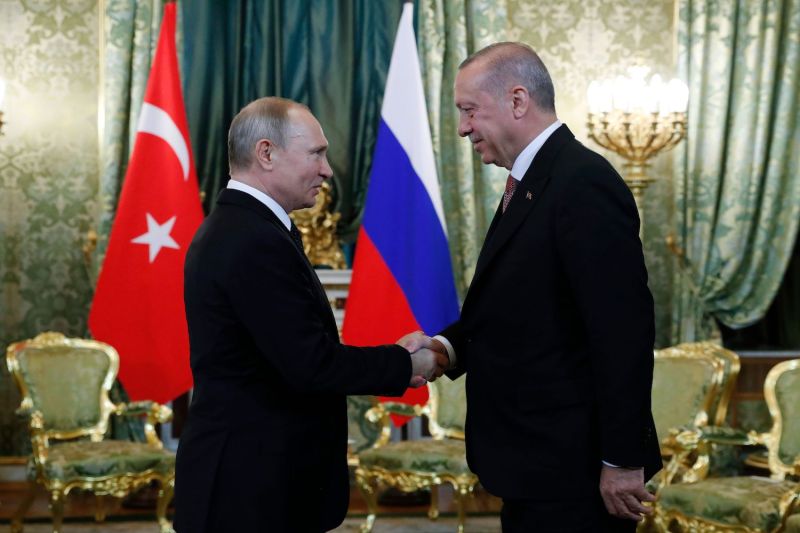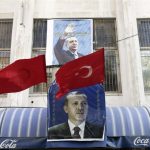Russian President Vladimir Putin shakes hands with Turkish President Recep Tayyip Erdogan at The Kremlin in Moscow on April 8. (MAXIM SHIPENKOV/AFP/GETTY IMAGES)
Strains in U.S.-Turkish relations are leading Erdogan into Putin’s embrace. Smart diplomacy and defense assistance can bring America’s NATO ally back into the fold.
Just months after U.S. President Donald Trump threatened Turkey with economic collapse for having jailed an American pastor, the NATO allies are heading toward a bigger crisis with implications for trans-Atlantic security. This time the dispute centers around Turkey’s intention to acquire the S-400, an air and missile defense system from Russia.
This imminent transaction has raised major concerns in Washington. As a result, Turkey could be sanctioned under the Countering America’s Adversaries Through Sanctions Act. The United States could even cancel the delivery of next-generation F-35 fighter jets to Turkey.
Given that the S-400 deal with Russia could have such adverse consequences for the U.S.-Turkey bilateral relationship, the real question is how this transaction was allowed to get so close to the finish line? The answer has as much to do with the Turkish President Recep Tayyip Erdogan’s penchant for brinkmanship as the Trump administration’s nonchalance.
For the Turkish president, the S-400 option was long viewed as a tactic to pressure Washington to improve the concession terms for the Patriot, an air and ballistic missile defense system to be transferred to an ally in need. Of all NATO members, Turkey faces the greatest threat from the proliferation of ballistic missiles in the Middle East. Back in 2011, a senior commander of Iran’s Islamic Revolutionary Guard Corps said Tehran would target NATO’s X-band radar in Turkey if the United States or Israel were to ever attack Iran.
The response from the alliance has been the phased adaptive missile defense shield, an integrated architecture of radars and interceptors to protect NATO countries against ballistic missiles, which is allegedly unable to provide cover for the whole of the Turkish territory due to Turkey’s proximity to Iran and Syria, leaving Ankara feeling vulnerable.
A more proper response, in the spirit of the NATO alliance, would have been to help Turkey’s domestic military industry develop indigenous capabilities for ballistic missile defense through technology transfers and co-production opportunities.
The S-400 deal has also become a critical component of Turkey’s policy in Syria, where Ankara’s position shifted over time from a regime change agenda to defending its security interests by preventing the expansion of Kurdish influence in northern Syria. By hinting at a rapprochement with Russia, Turkey wanted to compel the U.S. government to review its policy of backing the Kurdish People’s Protection Forces (YPG) in Syria
By hinting at a rapprochement with Russia, Turkey wanted to compel the U.S. government to review its policy of backing the Kurdish People’s Protection Forces (YPG) in Syria
, which it considers an offshoot of the Kurdistan Workers Party (PKK)—a group recognized as a terrorist organization by Washington.No other policy decision in history has done as much harm to the image of the United States in Turkey as the ongoing effort to weaponize the YPG. Washington may have indeed seen this entity as a useful group in the fight to defeat the Islamic State, but the cost has been the total alienation of Ankara. The erosion in mutual trust provoked by the continuing U.S. support to this Kurdish entity was a major consideration that altered Ankara’s calculus about the purchase of this strategic weapons system from Russia.
To make matters worse, Turkey’s early moves in the direction of Moscow were met with bad signaling and procrastination in Washington. When Ankara first inked the deal with Moscow in 2017, U.S. officials did not immediately make it clear to Turkish authorities how grave the consequences would be if they went through with this purchase, possibly thinking that this was essentially a negotiating tactic and that in due time as a NATO ally, Turkey could easily be persuaded to drop the Russia option. Another possible reason is that the sanctions legislation had not yet been adopted.
It is only now, within a few months of the delivery, that the U.S. government is mounting political and diplomatic pressure to dissuade Turkish authorities
It is only now, within a few months of the delivery, that the U.S. government is mounting political and diplomatic pressure to dissuade Turkish authorities
from following through. This criticism was repeated last week by U.S. Vice President Mike Pence, who warned Ankara by declaring, “Turkey must choose. Does it want to remain a critical partner in the most successful military alliance in history, or does it want to risk the security of that partnership by making such reckless decisions that undermine our alliance?”Trump himself has done a rather poor job in communicating unambiguously the U.S. position to his Turkish counterpart. Erdogan remains under the illusion that Trump will end up using his presidential prerogatives to settle this dispute. In addition, the U.S. administration took 17 months to renew its offer to sell the Raytheon-made Patriot missile system to Turkey.
Every single month of U.S. nonresponse brought Turkey one step closer to its ill-conceived deal with Russia. Even today, Turkish policymakers are not assured that the U.S. administration will actually be able to overcome congressional resistance to the delivery of the Patriot system to Turkey.
The two NATO allies are now trapped in a standoff with little room to maneuver. Turkey seems unwilling to change tack, despite vocal criticism in Washington, while the United States is already contemplating imposing sanctions
Turkey seems unwilling to change tack, despite vocal criticism in Washington, while the United States is already contemplating imposing sanctions
; canceling the planned deliveries of the F-35, which Turkey had committed to purchase 100 units of for its air force and an additional 24 for its navy; and excluding Turkey from the industrial co-production component of the F-35 program, in which Turkish companies had been allocated a portfolio of close to $12 billion.But even under a best-case scenario for Turkey, in which Trump stands up to Congress to protect Ankara from sanctions on national security grounds, the Turkish government cannot escape the inevitable binary choice between a Russian air defense system and an American fifth-generation fighter jet. Opting for the S-400s would mean that Turkey would lose out on a genuine force multiplier, thus impairing its own capacity to project power and future NATO interoperability. The more likely—and more damaging—scenario of U.S. sanctions on Turkey would have long-term strategic consequences for NATO, possibly even leading Ankara to question its membership.
To avert this shock to the trans-Atlantic alliance, the U.S. government should use the next few months to persuade Ankara to forgo this purchase from Russia.
To avert this shock to the trans-Atlantic alliance, the U.S. government should use the next few months to persuade Ankara to forgo this purchase from Russia.
For starters, the United States should improve its offer for Patriot missiles. Turkish authorities say that the latest U.S. offer, which includes 80 units of the Patriot MIM-104E Guidance Enhanced Missiles and 60 units of its more advanced version, the PAC-3 MSE, is still considerably more expensive than the Russian system. Washington also needs to guarantee its deliveries should Ankara decide to cancel its commitment to buy the Russian system.In return, Turkey could seek to soften the blow for Russia. One option would be persuading Russia to seek third-country customers for the S-400 system earmarked for Turkey and possibly compensating Moscow for any eventual financial losses. Another option would be to use the committed funds to purchase nonstrategic weapons systems from Russia, namely standalone units such as the Pantsir anti-aircraft defense systems, which do not pose a threat to the integrity of Turkey-based NATO assets.
Averting the looming threat to the NATO alliance will require both Washington and Ankara to recognize their past missteps and demonstrate a willingness to shift their positions. That may be too much to ask from Trump and Erdogan, but it’s essential for the strength of the trans-Atlantic alliance.
By Sinan Ulgen
Source: FP



